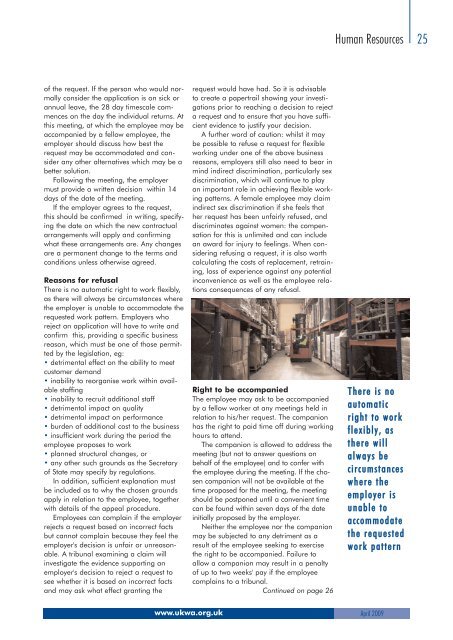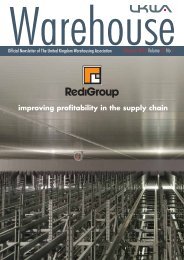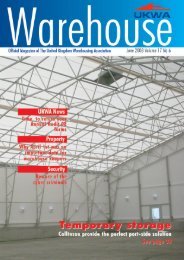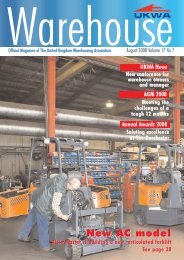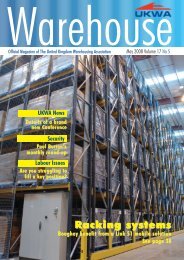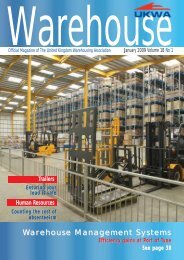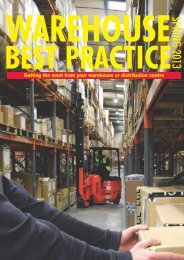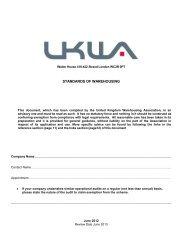ukwa 2 cover - United Kingdom Warehousing Association
ukwa 2 cover - United Kingdom Warehousing Association
ukwa 2 cover - United Kingdom Warehousing Association
Create successful ePaper yourself
Turn your PDF publications into a flip-book with our unique Google optimized e-Paper software.
Human Resources 25<br />
of the request. If the person who would normally<br />
consider the application is on sick or<br />
annual leave, the 28 day timescale commences<br />
on the day the individual returns. At<br />
this meeting, at which the employee may be<br />
accompanied by a fellow employee, the<br />
employer should discuss how best the<br />
request may be accommodated and consider<br />
any other alternatives which may be a<br />
better solution.<br />
Following the meeting, the employer<br />
must provide a written decision within 14<br />
days of the date of the meeting.<br />
If the employer agrees to the request,<br />
this should be confirmed in writing, specifying<br />
the date on which the new contractual<br />
arrangements will apply and confirming<br />
what these arrangements are. Any changes<br />
are a permanent change to the terms and<br />
conditions unless otherwise agreed.<br />
Reasons for refusal<br />
There is no automatic right to work flexibly,<br />
as there will always be circumstances where<br />
the employer is unable to accommodate the<br />
requested work pattern. Employers who<br />
reject an application will have to write and<br />
confirm this, providing a specific business<br />
reason, which must be one of those permitted<br />
by the legislation, eg:<br />
• detrimental effect on the ability to meet<br />
customer demand<br />
• inability to reorganise work within available<br />
staffing<br />
• inability to recruit additional staff<br />
• detrimental impact on quality<br />
• detrimental impact on performance<br />
• burden of additional cost to the business<br />
• insufficient work during the period the<br />
employee proposes to work<br />
• planned structural changes, or<br />
• any other such grounds as the Secretary<br />
of State may specify by regulations.<br />
In addition, sufficient explanation must<br />
be included as to why the chosen grounds<br />
apply in relation to the employee, together<br />
with details of the appeal procedure.<br />
Employees can complain if the employer<br />
rejects a request based on incorrect facts<br />
but cannot complain because they feel the<br />
employer's decision is unfair or unreasonable.<br />
A tribunal examining a claim will<br />
investigate the evidence supporting an<br />
employer's decision to reject a request to<br />
see whether it is based on incorrect facts<br />
and may ask what effect granting the<br />
request would have had. So it is advisable<br />
to create a papertrail showing your investigations<br />
prior to reaching a decision to reject<br />
a request and to ensure that you have sufficient<br />
evidence to justify your decision.<br />
A further word of caution: whilst it may<br />
be possible to refuse a request for flexible<br />
working under one of the above business<br />
reasons, employers still also need to bear in<br />
mind indirect discrimination, particularly sex<br />
discrimination, which will continue to play<br />
an important role in achieving flexible working<br />
patterns. A female employee may claim<br />
indirect sex discrimination if she feels that<br />
her request has been unfairly refused, and<br />
discriminates against women: the compensation<br />
for this is unlimited and can include<br />
an award for injury to feelings. When considering<br />
refusing a request, it is also worth<br />
calculating the costs of replacement, retraining,<br />
loss of experience against any potential<br />
inconvenience as well as the employee relations<br />
consequences of any refusal.<br />
Right to be accompanied<br />
The employee may ask to be accompanied<br />
by a fellow worker at any meetings held in<br />
relation to his/her request. The companion<br />
has the right to paid time off during working<br />
hours to attend.<br />
The companion is allowed to address the<br />
meeting (but not to answer questions on<br />
behalf of the employee) and to confer with<br />
the employee during the meeting. If the chosen<br />
companion will not be available at the<br />
time proposed for the meeting, the meeting<br />
should be postponed until a convenient time<br />
can be found within seven days of the date<br />
initially proposed by the employer.<br />
Neither the employee nor the companion<br />
may be subjected to any detriment as a<br />
result of the employee seeking to exercise<br />
the right to be accompanied. Failure to<br />
allow a companion may result in a penalty<br />
of up to two weeks' pay if the employee<br />
complains to a tribunal.<br />
Continued on page 26<br />
There is no<br />
automatic<br />
right to work<br />
flexibly, as<br />
there will<br />
always be<br />
circumstances<br />
where the<br />
employer is<br />
unable to<br />
accommodate<br />
the requested<br />
work pattern<br />
www.<strong>ukwa</strong>.org.uk April 2009


